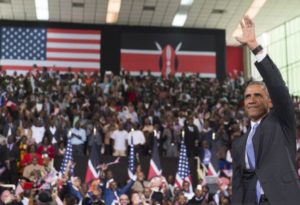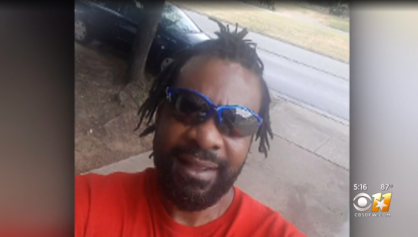
U.S. President Barack Obama waves after speaking at Safaricom Indoor Arena in Nairobi on July 26, 2015 (AFP Photo/Saul Loeb)
President Obama has been known to give African Americans a dose of “tough love,” and apparently he has done the same in Kenya. In what was partly an official visit and partly a family reunion, President Obama delivered a speech to wrap up his time in his ancestral homeland.
As the International New York Times reported, Obama reiterated the message he gave during his 2009 presidential trip to the African continent—that “the future of Africa is up to Africans,” and that they should not look “to the outside for salvation.”
On Sunday, he told the crowd that Kenya’s future lay within itself.
“I’m here as a friend who wants Kenya to succeed,” he said, vowing to aid the nation in its fight against Al Shaabab, the al Qaeda affiliated terrorist group. “We will stand shoulder to shoulder with you in this fight against terrorism—for as long as it takes.”
The first Kenyan-American president had words of criticism for the African nation in the areas of corruption, ethnic division and human rights, asserting that Kenyans “will be familiar with the need to manage family politics sometimes.”
“I don’t want everybody to get too sensitive,” Obama said, “But here in Kenya it’s time to change habits.” He called corruption “an anchor that weighs you down.”
Obama referred to his own family’s struggles, and progress from humble beginnings. He spoke of how his grandfather worked as a cook in the British military.
“He was referred to as a boy, even though he was a grown man,” Obama said. “What these stories also tell us is about the arc of progress. We have to know our history so that we learn from it. A young, ambitious Kenyan today should not have to do what my grandfather did, and serve a foreign master.”
He told the audience that today, there are more opportunities for Kenyans to succeed in their own country.
“You don’t need to do what my father did, and leave your home in order to get a good education and access to opportunity. Because of Kenya’s progress, because of your potential, you can build your future right here, right now,” he said, to which the audience responded with thunderous applause.
The president also spoke of the isolation of Muslim minority groups in Kenya, and the oppression of women.
“Treating women and girls as second-class citizens, those are bad traditions,” he said. “They need to change. They’re holding you back.”
During a press conference with Kenyan President Uhuru Kenyatta, Obama also called attention to Kenya’s policy of discrimination against people based on sexual orientation. Additionally, he acknowledged America’s own shortcomings, including the Confederate flag issue and the Charleston massacre.
Time magazine called the Obama speech, “part state address, part commencement speech.” When it comes to lecturing Black people with “tough love”—telling them about their failings and urging them to do better—we have been down this road before with the President.
At the Morehouse College commencement in May 2013, President Obama lectured graduates on their responsibilities as men.
“My job, as President, is to advocate for policies that generate more opportunity for everybody,” he said. “But along with collective responsibilities, we have individual responsibilities. There are some things, as Black men, we can only do for ourselves. There are some things, as Morehouse Men, that you are obliged to do for those still left behind.”
Noting he was raised by a single mother and grandparents, and wished his father was present, Obama said he wanted to break the cycle.
“Keep setting an example for what it means to be a man,” he added. “Be the best husband to your wife, or your boyfriend, or your partner. Be the best father you can be to your children. Because nothing is more important.”
When people can and should do better, straight talk along with a helping hand and good intentions is not necessarily a bad thing. However, although President Obama has told Africans not to look for outside help for their salvation and has told Black Americans to essentially pull themselves up by their bootstraps, he has not dome the same for other nations and non-Black people.
For example, Israel received $3 billion in annual aid from the U.S. and has received over $121 billion since its founding, including a quarter of its defense budget from America. Will Obama tell them to solve their problems by themselves?
Will he go to the Israeli government and the Israeli people, and denounce the apartheid system of occupation against the Palestinian people, the racial discrimination against Arab people and the racism against African refugees and asylum seekers?
Will he criticize the racism and second-class treatment of Ethiopian Jews in Israel, who, like Black people in America, have been protesting their harsh conditions? Would Obama travel to Europe, Japan or South Korea and lecture them, with all their wealth, on their need to exist without U.S. military support?
President Obama, like any American president, would not go to any other country not controlled by Black people and give tough love speeches. Ultimately, Black people are not a top priority in a domestic or geopolitical sense, and their lobbyists lack sufficient clout. Although the U.S., like China, is encroaching on Africa and its resources in a manner that is not beneficial to the continent, if America saw real strategic value in Africa, it would do whatever is necessary to provide proper assistance, relief and investment.
Instead, whether in Kenya or at Morehouse, President Obama lectures and speaks down to Black people, leaving Blacks hanging in the process.

